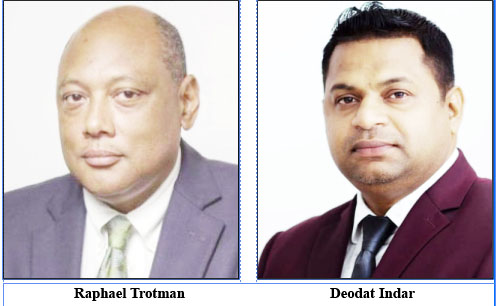`It has taken good and special care of some interest groups, but left 90% of the people out altogether – particularly the working class and poor’
APNU+AFC MP Raphael Trotman and Minister in the Ministry of Public Works Deodat Indar yesterday clashed over the merits of Budget 2020 as debate on the long-delayed presentation began at the Arthur Chung Conference Centre.
While government ministers sought to convince the House that all Guyanese will benefit from the budget measures, members of the opposition argued that the “public” was neglected while special interest groups such as the private sector benefit.
“This budget has fallen woefully short of everyone’s expectations. It has taken good and special care of some interest groups, but left 90% of the people out altogether – particularly the working class and poor seeking to elevate themselves out of poverty,” former Minister of Natural Resources Trotman declared.
He endorsed the commentary in a recent interview of former Finance Minister Winston Jordan who described the budget as “deformed, defective, deceptive, divisive and discriminatory” and disputed claims that the treasury was empty.
“It is deformed because it sought to copy an APNU+AFC template and twisted it into deformity. It is defective because it failed to go to the full extent to remedy the maladies it was claimed to be addressing – COVID-19 and opening the economy. It is deceptive because there is nothing monumental or awesome about it. It is divisive because it seeks to punish or ignore groups that offer no political value to the government and it is discriminatory because it looks after cliques and special-interest groups, and leaves out the vast majority of others,” Trotman charged.
He specifically noted that since the budget was delivered amidst the COVID-19 pandemic and social upheaval and tension within the country it was expected that it would have addressed cohesion, or the absence thereof, and the pandemic.
He highlighted the four-fold increase of the overall deficit from $17 billion in 2019 to $75 billion and questioned the absence of traditional measures.
“We know that there is now enough fiscal space to reduce VAT to 11%, why wasn’t it done? We know that pensions were to be raised to be half of the minimum wage, why was this cancelled? We know that public sector workers were slated for an increase, why were they penalised? We know that the Income Tax threshold was to be increased, what happened?” Trotman questioned.
Describing the presented budget as visionless, Trotman recommended that government embrace the ten-point Decade of Development proposed by former President David Granger who is not among his coalition’s MPs in parliament.
“The PPP took over an economy that was described as the fastest growing in the hemisphere, if not in the world…for the past five years, there has been sustained and envious growth…We weren’t a `deh bad’ country that we used to be or some are trying to make it out to be,” he stressed, while asking where the PPP/C were able to find $329 billion if the treasury was empty.
“No Houdini or illusionist could conjure up a $330B budget if indeed the treasury was empty… Guyana under the Granger-led administration, and with Winston Jordan as Minister of Finance, experienced five straight years of sustained economic growth at an average of 3.6% of GDP,” Trotman declared.
Minister within the Ministry of Public Works, Deodat Indar however disagreed with this assessment.
According to Indar under the approach laid out by the Irfaan Ali administration, citizens of all walks of life can be assured that his policies and commitment will result in prosperity.
“This Budget gives back to the private sector, gives back to citizens … all will be catered for under this budget,” he stressed.
Cost of Living
He reiterated that some measures that make this Budget pro poor include the reduction in the Cost of Living by the reversal of VAT on electricity and water.
He described the former measure as “a hardship placed on the Guyanese people by the APNU+AFC” before comparing this to an increase in disposable income by directly providing $25,000 per household through $4.5B in the Budget.
Indar stressed that more than half of the budget was spent from January 1, 2020 to August 2, 2020 but provided no actual figure. He went on to accuse Jordan of being incompetent for claiming that “the PPP/C administration has to spend $329.5 billion within the last quarter of the year”. Jordan never made such a statement.
The former minister has criticized the budget for “eroding the revenue base of the country, while enormously inflating the deficit” and advised opposition parliamentarians to demand a clear answer as to how much has been spent.
Indar however stressed that in 2014, the final year of the PPP/C’s administration, tax revenue totaled $135.2 billion but within five years, the APNU government’s tax revenues sky-rocketed by $91 billion an increase which came directly from the pockets of the citizens of Guyana.
“The sum-effect of policies of the APNU is that the citizens of Guyana were left poorer,” he maintained.
Also supporting the budget was Minister of Labour Joseph Hamilton who hailed the return of his ministry. The portfolio of labour was a department within the Ministry of Social Protection under the APNU+AFC coalition.
According to Hamilton, the Ministry will focus on capacity building, human development and protection of workers’ rights.
Hamilton stressed that in light of the COVID-19 pandemic, the Occupational Safety and Health Department will continue to expand its response.
“So far assistance was sought from the Ministry of Public Health and the International Labour Organization (ILO) to address the situation. The ILO shared posters, a workplace video and a range of guidance materials which addressed workplace policies for the COVID-19 Virus, Safe and Healthy return to work, a Ten Step Tool and Teleworking to name a few,” he explained, adding that the information which was received was shared with the social partners, key stakeholders, employers and workers.
A checklist developed by the Department included areas, such as policy, planning, risk assessment, management, communication, prevention and mitigation.
For the period October – December 2020, the Department will continue to develop these measures.
Specifically staff vacancies within the OSH Department will be filled and existing staff will be trained to deliver training programmes to employers and workers in both the public and private sectors inclusive of the informal economy re: COVID-19 Protocols.
The technical capacity of the department to facilitate the use of Zoom, Microsoft and Google technology for the training of employers and workers in their respective workplaces will be improved and an all-terrain vehicle will be acquired to facilitate the inspection visits to workplaces in Georgetown and the hinterland communities.










